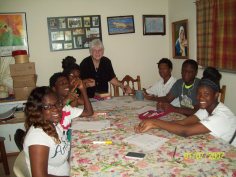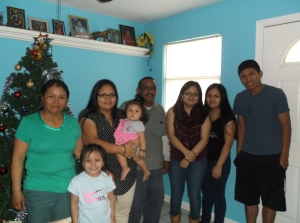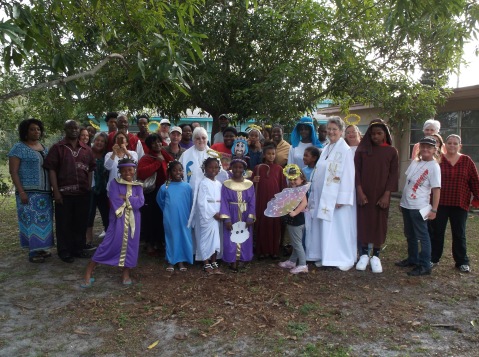On January 13th, 2016 the National Catholic Reporter briefly told the story of a letter of excommunication sent to a Roman Catholic woman in Kansas who was newly ordained to the priesthood. I share this story below noting that it is not unlike the stories of many of the over 200 ordained Roman Catholic Women worldwide who continue in their sacramental ministries and works of mercy regardless of such mean spirited and meaningless communications, for we reject the church’s “excommunication” penalty for following God’s calling and conscience. We also congratulate Rev. Georgia Walker whose life has been dedicated to peace and justice action on her Priestly Ordination. After Rev. Walker’s story I will share my own responses to Bishop Frank Dewane who sent me not one but two letters in 2008 when I was ordained a priest by the Roman Catholic Women Priests.
But,first, the words of the Scriptures that set us on solid ground in the face of man-made rules and clarify our rejection of the church’s so called self- excommunication:
Romans 8: 14-19:
“Those who are led by the Spirit of God are the children of God. For the Spirit that God has given you does not enslave you and trap you in fear;instead,through the Spirit God has adopted you as children, and by that Spirit we cry out “Abba”! God’s Spirit joins with our spirit to declare that we are God’s children. And if we are children,we are heirs as well: heirs of God and coheirs with Christ sharing in Christ’s suffering, and sharing in Christ’s glory. Indeed I consider the sufferings of the present to be nothing compared with the glory that will be revealed in us. All creation eagerly awaits the revelation of the children of God”.
We, women and men and all people led by the Spirit are children of God, (not only sons of God but daughters of God) we are co-heirs of God, and called according to God’s purposes.
And (Romans 8:28) ” We know that God makes everything work together for the good of those who love God and have been called according to God’s purpose”.
Romans 8:33-39.
“Who will bring a charge against God’s chosen ones? Since God is the One who justifies,who has the power to condemn: Only Christ Jesus, who died–or rather, was raised–and sits at the right hand of God,and who now intercedes for us!
What will separate us from the love of Christ? Trouble? Calamity? Persecution? Hunger? Nakedness? Danger? Violence? As scripture says,”For your sake, we’re being killed all day long; we’re looked upon as sheep to be slaughtered”. Yet in all of this we are more than conquerors because of God who has loved us. For I am certain that neither death nor life, neither angels nor demons, neither the present nor the future, neither heights nor depths–nor anything else in all creation–will be able to separate us from the love of God that comes to us in Christ Jesus, our Savior”.
It is in this spirit that we reject the power of men who choose to ordain only themselves (since the 12th Century) to excommunicate us based upon their own rules (Canon Law 1024) .
From the National Catholic Reporter Jan 13,2016
Kansas City’s first woman priest has been excommunicated
Georgia Walker after her ordination Jan. 3 at St. Mark Hope and Peace Lutheran Church in Kansas City, Mo. (Dawn Cherie Araujo)
Dawn Cherie Araujo | Jan. 13, 2015
Georgia Walker, the woman ordained earlier this month as Kansas City’s first female priest by the Association of Roman Catholic Women Priests, has been excommunicated.
In a letter delivered to Walker’s home Monday afternoon by certified mail, Kansas City-St. Joseph Bishop Robert Finn said Walker had been advised of the “seriousness of her contemplated course of action to attempt to receive sacred ordination” and that her excommunication was effective immediately. He added, however, that the diocese remained ready to assist Walker “if or when she seeks such process in good faith.”
Walker says she plans to continue attending Mass at her parish church, St. James, though she will not be taking part in any liturgy.
“I’m not going to take Communion,” she told NCR. “I won’t in any way compromise the parish, but I attend to still be part of the community and go there for worship on Sunday.”
Bridget Mary Meehan, the Association of Roman Catholic Women Priests bishop who presided over Walker’s Jan. 3 ordination, posted to her blog both Finn’s letter and a personal response, arguing that women ordained through the association are not leaving the church, but are leading it.
“The principal consecrating Roman Catholic male bishop who ordained our first women bishops is a bishop with apostolic succession within the Roman Catholic Church in communion with the pope. Therefore, our bishops validly ordain deacons, priests and bishops,” she continued.
In an email to NCR, diocesan director of communications Jack Smith verified the accuracy of the letter, saying the excommunication is not an action of Finn or the diocese, but “merely a notice recognizing that under church law, Ms. Walker has incurred automatic excommunication because of her participation in a simulated ordination. We do hope and pray that Ms. Walker is reconciled to the Church and are eager to assist her in approaching the Vatican to reverse this automatic excommunication if she chooses.”
Previously, the diocese’s vicar general, Fr. Charles Rowe, had invited Walker to meet with him in order to discuss her ordination. However, the two were unable to schedule a meeting.
[Dawn Cherie Araujo is a staff writer for Global Sisters Report, a special project of the National Catholic Reporter. Her email address is daraujo@ncronline. Follow her on Twitter @dawn_cherie.]
My story:
I received two letters of “warning” from Bishop Frank Dewane of the Diocese of Venice in Florida, one before my Diaconate ordination and the other before my priestly ordination.
The following is a letter I wrote to three wonderful women who also became Roman Catholid Women Priests: Gloria Carpeneto of Maryland and Gabriella Velardi Ward of New York who were to be ordained Roman Catholic Priests with me, and Mary Ann Schoettly who would be ordained a transitional Deacon in Boston on July 20,2008.
“Dear Gloria, Gabriella and Mary Ann and Sisters moving in the Spirit toward Ordination in July,and all my sisters and brothers,
Watch your mailboxes and the knocks at the door today-the good news and affirmation of our courageous stand may come to you as it has to me. I received my letter from the Bishop (Frank J. Dewane, Diocese of Venice Florida) this morning by Certified mail. It is the letter the other Bishops have used and says that “recent reports indicate ” my intention “to be ordained in Massachusetts in July”. He “writes out of concern for my mortal soul”-to which I say , and what of your own? He says I am “separating myself from the Catholic church of my own choice” (“What or who shall separate me from the love of Christ?”-Romans 8:33-39 is wonderful! and that I am asked to refrain from “participating in what will be a mockery of the Sacrament of Holy Orders”. (And what of the mockery of a one gender dominated church?) He quotes JPII and encourages me not to “separate myself from the Catholic church!” I am writing to assure him that I have not done so nor will I-but I will be ordained in obedience to the Spirit! I will answer this letter by return Certified Mail. We have plenty of answers on hand so I do not even have to be totally original. Just letting you know that this time may be coming for you as well. It does cause a momentary knife-like twist in the area of the heart-but the scar grows quickly and peace and righteous indignation take its place and we rejoice. Rejoice for me and when it happens-Rejoice!
Love and Peace,
Judy”
And this is my response to the Bishop:
April 22, 2008
Frank J. Dewane
Bishop of Venice in Florida
P.O. Box 2006
Venice, Florida 34284-2006
Dear Bishop Dewane:
Your sources are correct that I am answering the call of the Spirit and intend to be ordained a priest in Massachusetts in July. I will continue by the grace of God to serve the poorest of the poor of this diocese primarily in an outdoor church in Fort Myers where often over a hundred hungry and homeless people are fed, clothed, sheltered and counseled and join me in worship each week. I am known as the pastor of the poor and there is no other diocesan Roman Catholic clergy present there although over forty volunteers assist me in this work of mercy. I will continue to serve God’s people as Jesus did with the “justitia, pax et gaudium” (justice, peace and joy) that the shield of this diocese promises them. After July, I will do this as a priest, offering the bread of life and cup of salvation to them as well. Please, therefore, replace your concern for the salvation of my soul with your concern for God’s poorest in your diocese.
I will be ordained by Bishops in valid succession who are, along with their priests and deacons, breaking Canon Law 1024 limiting sacred orders to men. We note that canon law is often contradictory and that Canon 849 states that baptism, not gender, is the gateway to all of the sacraments. We also note that recent scholarship, such as that of Gary Macy and Dorothy Irvin, confirms that women were ordained in the first twelve hundred years of the church’s history and that this evidence contradicts the later prohibition.
Regarding the church’s teaching we note that a teaching or law of the church is authoritative only if it is “received” by the sensus fidelum, the community of faith. If the community of faith does not accept the law it has no effect on us. St. Augustine taught that an unjust law is no law at all. Since 70% of U.S. Catholics favor women’s ordination, and this is a worldwide sentiment as well, we do not “receive” or accept the Church’s prohibition against the ordination of women and the second-class citizenship it imposes on women.
All people have a moral obligation to disobey an unjust law. Pope Benedict XVI said this, written when he was Cardinal Ratzinger, in the commentary section of the Doctrine of Vatican II, volume V, p. 134: “Over the Pope as the expression of the binding claim of ecclesiastical authority, there still stands one’s own conscience, which must be obeyed before all else, if necessary even against the requirement of ecclesiastical authority.”
I do not and will not separate myself, nor can you separate me from the Body of Christ. Romans 8:31-39 is clear: “Who should bring a charge against God’s chosen ones…?” Nothing and no one can separate us from the love of God in Christ Jesus.
Roman Catholic Womenpriests are leading the way to a renewed Roman Catholic Church in which the full equality of women and all people will be a reality. Like Mary of Magdala, apostle to the apostles, and the women deacons, priests and bishops who served in the early centuries of our church, we are offering a model of a renewed priesthood in a community of equals. We pray that you and our brothers will be there at our side as one Church.
Sincerely yours in Christ,
Judith A.B.Lee”
I have not had one moment of regret about my priestly ordination in July of 2008. I have had great joy and the heartaches of loving and serving God’s poorest people, but not even one regret. Long before and ever since I have served the poor and homeless as is my calling. I often do this with Rev. Judith Beaumont my life partner and co-Pastor at Good Shepherd who was ordained a Roman Catholic Priest in January 21st of 2012 with almost 400 people present in affirmation. We send her blessings and hearty congratulations! Felicidades! as she embarks upon her fourth year in Priestly service. She too received two letters from Bishop Dewane. Her life was an entire life of service, especially as a Benedictine Sister of over 34 years. We met serving the homeless in Hartford, Connecticut in 1988 where she was the Director of My Sisters’ Place, a four tier program and residences for homeless women and children, the mentally ill and women and men in need of a single room occupancy residence that was erected,along with a residence for women and children with her dedicated hard work. Service is our call but priestly service only became possible when the Roman Catholic Women Priest Movement came into existence. (Please see http://www.romancatholicwomenpriests.org for the history/herstory of this). The difference for us now is that as Priests we also serve God’s people, especially the outcast and the poor, Sacramentally. September 2016 marked our 2oth Baptism( of children and adults) in our Good Shepherd Inclusive Catholic Community, in Fort Myers, Florida. (I was also blessed to baptize a baby in Bogota, Colombia). I cannot count how many anointings of the sick and dying (formerly called Last Rites) we have been blessed to give. We presented sixteen young people and adults for Confirmation in 2014 and presided at a marriage of a formerly homeless man and woman. I have “heard confessions” and offered the Sacrament of Reconciliation. And we offer the Eucharist regularly at the Good Shepherd and other places. For us, the sharing of the Sacraments are the most holy of moments and we are humbled and awed to be able to include people on the margins in God’s expansive and abundant love.
It is not we who are out of communication with God and God’s people. We continue to pray for the Church as Jesus did
“that all may be one.”
Thanks be to God,
Rev. Dr. Judy Lee, RCWP
CO-Pastor the Good Shepherd Inclusive Catholic Community , Fort Myers, Florida
Below Pastor Judy Beaumont and I with our God Shepherd Community Dec 2015


Pastor Judy Beaumont and I with Rev. Gabriella Velardi Ward, Pastor of the St. Praxedis Inclusive Catholic Community in New York and Rvda. Marina Teresa Sanchez Mejia of Cali, Colombia who is celebrating her second year of Priestly Ordination, as of January 17,2014. Felicidades Rvda. Marina Teresa y Rvda. Judy Beaumont en el aniversario de sus ordenaciones presbiteral de 17 de enero, 2014 y 21 de enero, 2012. Amor y Bendiciones!



























Recent Comments